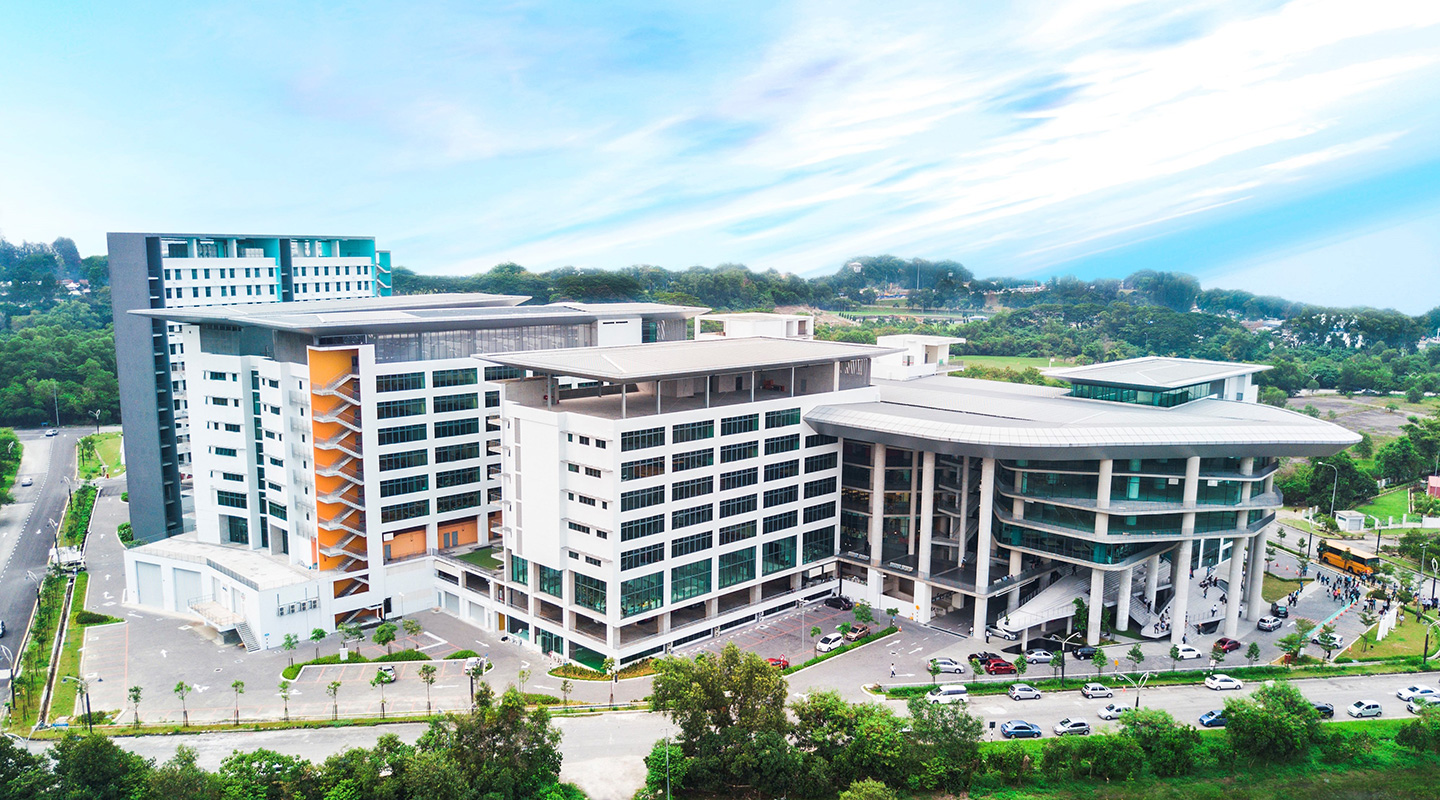
The Asia Pacific University of Technology & Innovation (APU) recognises that its economic, social and civic responsibilities are central to its activities and that the University’s core business and teaching operations have the potential to affect the environment, health and prosperity of its employees, its students and the communities in which it operates.
Asia Pacific University of Technology & Innovation (APU)’s Ultra-Modern University Campus is strategically located in Technology Park Malaysia (TPM), Kuala Lumpur. APU’s Campus blends technology, integration, innovation and creativity under one roof. Technology Park is also representing Malaysia at Dubai Expo with the theme of “Energising Sustainability”. TPM also conducts Tecoma planting exercise was aimed at encouraging students to appreciate the values of protecting the environment by mitigating the effects of climate change. Tecoma flowering tree, also known as the Malaysian Sakura, is commonly spotted in Malaysia with its burst of pink, purple, or white flowers. When in full bloom twice a year during the hot weather periods, it certainly adds a natural beauty to the surroundings. TPM has more than 200 tecoma trees within its 686 acre campus in Bukit Jalil, Kuala Lumpur.
In support of this belief, the University wishes to play a central role in protecting and enhancing sustainability locally, nationally and internationally, by ensuring that this principle underpins all its operations and activities.
We are pleased to introduce the Sustainable Development Goals (SDG) Report for the year 2022 by Asia Pacific University of Technology and Innovation (APU). Download Report.
ENVIRONMENT & CLIMATE ACTION POLICY
Sustainable Development – "development that meets the needs of the present without compromising the ability of future generations to meet their own needs” (Brundtland Report, 1987). We at APU are committed to sustainable development and operating practices through the responsible management of building design, construction, and renovation, landscape practices, energy use, water and waste management, emissions, transportation, and procurement, within a framework of regulatory compliance and fiscal prudence. Through bold leadership and, in alignment with Government and industry, we will put environmental issues at the forefront of our operations. We recognize the role we can play in driving policy, changing behaviors and providing new ideas and solutions to difficult global problems.

CLIMATE ACTION GOALS:
To integrate environmental and carbon action into all University processes and to maximize the influence of the University in reducing its footprint through education research and its operations.
APU has committed to achieving net zero greenhouse gas emissions by 2050. This is not a simple journey but it is necessary and important. Reaching net zero emissions will require collective effort and support from all our staff, students, and external stakeholders. To achieve this, we must ensure that we integrate climate action into all that we do. Please read the commitent HERE.
RESPONSIBILITY:
The Environment and Climate Action Board (attendees from Research, University, Professional Services and Students) is accountable for ensuring the Policy is implemented. Implementation will be embedded in all new decisions/ operations and activities. All employees have a responsibility to ensure that the aims and objectives of the policy are met.
APU APPROACH:
- We will seek to create a culture on campus that supports and encourages staff and students to recognize that we all have an element of personal responsibility for the environment and to act on that.
- We will strive to integrate and balance economic, social, and environmental responsibilities within all its activities. We are committed to operate as a responsible University, addressing the challenges of sustainable development.
- We will continually improve, and to meet environmental legislative and regulatory requirements as they relate to all our activities.
- We will continuously review our performance against the sustainability strategy using a quantitative and qualitative performance measurement approach. A report will be circulated to all APU Board members for review.
POLICY AIMS:
The University requires its staff, students, partners and suppliers to:
Comply with all relevant environmental legislation and regulations as well as other requirements to which they subscribe,
- Set, communicate and implement clear objectives and targets to ensure continued improvement in environmental performance,
- Proactively act in ways to support environmental and climate action, raising awareness and recognizing positive action, whether it be teaching, researching or other University related activity,
- Demonstrate commitment to managing, minimizing, and mitigating the impacts from operations, activities, research, and education,
- To co-operate, where possible, with others to develop, utilize and share best practice in terms of environmental performance at a local, regional, and international level,
- Demonstrate commitment to improve continually and monitor environmental performance, report openly and transparently to support greater recognition of the benefits of environmental change and ensure that outcomes do not create a detriment to any group with protected characteristics within our community.
The University will embrace the Environment and Climate Action Agenda both strategically and globally through its development of footprint reduction initiatives, Climate Action plans and staff, student, and community engagement. We will strive to minimize negative impacts and optimize positive opportunities by delivering our Climate action targets and goals through our strategies, recognizing our global and local reach, through the divers operations, partnership and programs.
APU Memberships & Commitments to Environmental, Social and Sovernance (ESG) & Sustainability:
Asia Pacific University (APU) is a member of various networks, organsiations and have commitment and pledges to bring positive actions for the future of our environment, through education and research, as well as facility and resource management in line with sustainability goals.
Race to Zero for Universities and College
https://www.educationracetozero.org/current-signatories
Malaysia Digital Climate Action Pledge (MDCAP)
https://mdec.my/esg-mdcap
SDG Academy - SDSN Network
https://www.unsdsn.org/malaysia
APU is Member of ESG Association of Malaysia
https://esgmalaysia.org/esg-association-corporate-members
APU Certificate of Membership
APU Professor is a UNESCO Chair
https://www.thestar.com.my/news/education/2022/08/07/apu-don-is-new-unesco-chair
Higher Education Sustainability Initiative (HESI) - United Nations
https://partnershipaccelerator.netlify.app/hesi/
The Association of Commonwealth Universities
https://www.acu.ac.uk/our-members/
APU go Green with Chartered Institute of Logistics and Transport Malaysia (CILTM) https://www.thestar.com.my/news/education/2022/06/12/logistics-industry-goes-green-with-apu
APU SET TO COLLABORATE WITH MOE TO INTEGRATE UN SDGS INTO THE CURRICULA
https://www.apu.edu.my/media/news/2755
EC-UK Climate Change Task Force
https://www.imeche.org/careers-education
https://www.imeche.org/news/news-article/tanjung-tualang-tin-dredge-no.5...
UN Policy Briefs contributed by APU Staff
https://policybriefs.our.dmu.ac.uk
APU Staff & Students publish book on "Sustainable and Innovative Green Public Procurement in Malaysia"
https://www.amazon.com/dp/B0CCZXJF53?ref_=pe_3052080_397514860
In addition, APU will endeavor to align with United Nations Sustainable Development Goals (SDGs).
“The Sustainable Development Goals (SDGs), also known as the Global Goals, were adopted by the United Nations in 2015 as a universal call to action to end poverty, protect the planet, and ensure that by 2030 all people enjoy peace and prosperity.
The 17 SDGs are integrated—they recognize that action in one area will affect outcomes in others, and that development must balance social, economic and environmental sustainability.”
See Sustainable Development Goals | United Nations Development Programme (undp.org) for more details.
The Green / Sustainability objectives of APIIT Education Group are based on the foundations of Reduce, Reuse, Recycle and Sustainability.
This can be clearly seen through Asia Pacific University of Technology & Innovation (APU) campus building itself where it was designed based on a concept of sustainable building, with consideration of the following aspects:
- Energy Efficiency
- Water Efficiency
- Indoor Environmental Quality
- Outdoor Environmental Quality
- Environmental Protection
- Transport Management
CERTIFICATE: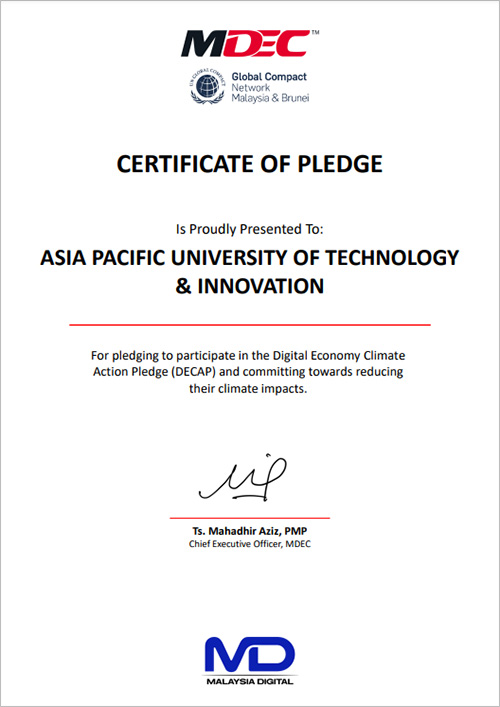
APU
Campus Design Strategy For Sustainability
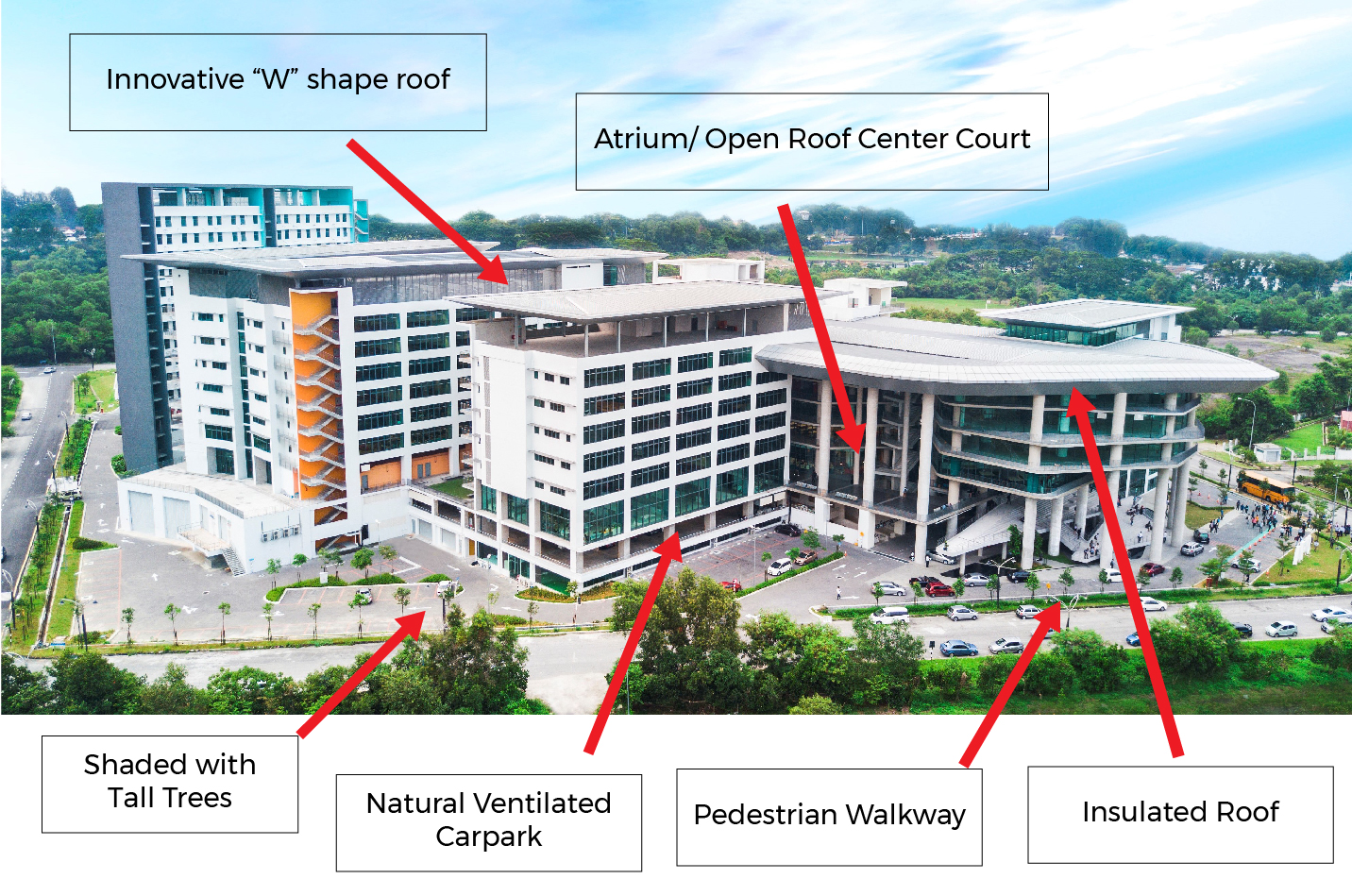
APU has committed to achieving net zero greenhouse gas emissions by 2050. This is not a simple journey but it is necessary and important. Reaching net zero emissions will require collective effort and support from all our staff, students, and external stakeholders. To achieve this, we must ensure that we integrate climate action into all that we do. Please read the commitent HERE.
APU uses the GHG Protocol Corporate Accounting and Reporting Standard, that provides requirements and guidance for us to prepare corporate-level GHG emissions inventory. The standard covers the accounting and reporting of seven greenhouse gases covered by the Kyoto Protocol – carbon dioxide (CO2), methane (CH4), nitrous oxide (N2O), hydrofluorocarbons (HFCs), perfluorocarbons (PCFs), sulphur hexafluoride (SF6) and nitrogen trifluoride (NF3). It was updated in 2015 with the Scope 2 Guidance, which allows companies to credibly measure and report emissions from purchased or acquired electricity, steam, heat, and cooling.
The Campus design strategy is based on four main aspects; Energy Efficiency, Water Efficiency, Indoor Environmental Quality and Outdoor Environmental Quality.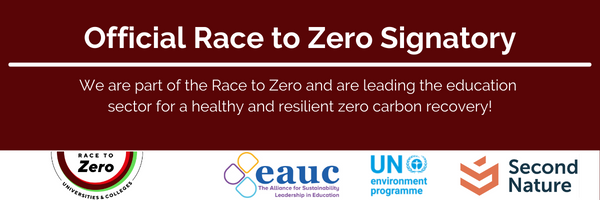
TOGETHER Towards Sustainable Communities
-
1. Energy Conservation Program

APU is committed in promoting energy conservation through awareness raising, as well as the adoption of energy efficient technologies through its campus programs and practices.
Building Orientation - The construction of the building has also considered on the rising and setting of the sun, to minimize the areas impacted by direct sunlight.
Daylighting – The building is designed to obtain 50% of its daylight needs from natural lighting, utilizing a 'Yacht Main Sail Dome' skylight made from Sperry Fabric Architecture, which is located within the Center Point space to diffuse daylight evenly and provide glare-free illumination for the offices and cafeteria surrounding the atrium.
The glass façade is installed with low-emissivity glass (low-e glass) that is reflective on the outside, allowing daylight into the building and minimizing heat from the sun.
A split window design for all exterior facades together with an internal light shelf helps to redirect natural light into the depths of the working space.
Energy-efficient lighting such as LED fluorescent tubes are used throughout the building instead of the conventional T8 fluorescent tubes. Integration with daylight/nightlight timer/sensors enable the artificial lighting to be switched off when daylight is adequate, resulting in energy savings.
A high roof allows light through is incorporated to bring in sufficient daylight to illuminate the Student Services area at the Level 3..
Spine Sharp Building - External facade is the only face of the building exposed to direct sunray (face of the building) which allows self-shading for the internal blocks, protection from direct sun rays into the building resulting in a larger area for protected footprint which allows direct t cooling with natural trough ventilation.
Open Perimeter Car Park Area - located at level 1 and 2 serves as a void space which provides natural ventilation to the parking area at level 1 and 2.
A roof light trough is incorporated to bring in sufficient daylight to illuminate the lounge area at the seventh floor.
Insulated Roof - to reduce heat absorption in the building, the roof top area is insulated using Rock Wool with a thickness of 50mm inclusive of sisalation sheet. Product of choice in metal roof applications as the foil-paper composition reduces the level of noise generated in metal roofs, thereby improving the acoustic ambience of the home.
Other Initiatives & Campaigns Undertaken
- Notices by light switches to remind staff and students to save energy and to turn off unwanted lights
- Turning off light after the completion of meetings/classes
- Email notification to staff to ensure that all PCs and equipment are turned off during public holidays and long weekends
- Replace traditional lighting with energy efficient LED and T5 fluorescent lighting in classrooms and offices
- Incorporation motion detector lighting and timed lighting in halls and corridors
-
2. Water Conservation Program

APU is dedicated in creating awareness on the understanding the importance of water conservation in daily lives of its communities. This wise management of the water resources act can be vividly translated through its conservation methods such as Rainwater Harvesting & Efficient Water Fittings promoting resource efficiency at all time.
Rainwater harvested is used for irrigation system, toilet flushing, combined with efficient water fittings such as dual flush toilets, waterless urinals and water taps equipped with aerators. This reduces potable water usage by more than 35%.
Other Initiatives & Campaigns Undertaken- Notices in washrooms to remind staff and students to save water and to ensure that taps are not left running
- Review of water harvesting solutions
-
3. Recycling Program

APU is passionate in implement greater change towards better environment & clean earth which will eventually bring positive effect on the economy and larger awareness among its staff and students.
Recycled Content Material - Usage of recycled content as defined in accordance with the ISO 14021 in the building was established during the design phase. The recycle content of the materials used in the building makes up at least 10% of the total value of the project.
Storage and Collection of Recyclables - Recycle bins are provided throughout the building. These are then collected daily by the cleaners and store at the allocated recycle bins for collection on a weekly basis by the recycling company appointed by the local authority.
Other Initiatives & Campaigns Undertaken- Use china cups/mugs and glasses rather than disposable cups for drinks where possible
- Re-use envelopes for internal mail
- Use the blank side of printed paper for scrap pads before recycling
- Set printers/copiers to print duplex or double sided and only print documents when absolutely necessary
- Send e-mails instead of letters or faxes where possible
- Use paperclips (that can be reused) instead of staples
-
4. Transportation Policy

APU is committed towards reducing the stresses and strains of everyday life and to help to reduce air pollution by promoting the reduction in independent travel and the increase in combined travel and the use of public transport.
The reduction of students travelling by car by promoting efficient in-house bus transport system to linkages (public trains and etc) or shorter travel distances to essential services.
Priority Green Vehicle Parking - Reserved parking lots are provided for green vehicles, thereby encouraging the use of such vehicles and carpools. Bicycle/Electric Bikes racks are also provided in the building to encourage occupants who stay within the vicinity to cycle rather than to drive to work.
Other Initiatives & Campaigns Undertaken- Use of APU’s buses for free transport to and from student accommodation, the local LRT station and academic buildings through its APU Campus-Connect.
- Promotion of car-pooling or ride-sharing with fellow staff members or classmates as a way to share fuel and toll costs and to relieve stress and frustration by promoting conversation during the journey to/from APU.
- On-Campus Residence - Reduced Carbon footprint.
-
5. Life on Land Conservation

APU aim to protect, restore and promote sustainable use of terrestrial ecosystems, sustainably manage forests, combat desertification, and halt and reverse land degradation and halt biodiversity loss.- Indoor Environmental Quality
Thermal Comfort via Hybrid Cooling - Cooling system in the building is provided via chilled water pipes which complements the conventional cold air supply system.
As the highest capacity of the building is rested in the concrete mass, direct cooling of the concrete slabs with embedded water pipes is the most efficient means to cool the building mass.
Noise Control - The advantage of the above cooling system is that the air ventilation rate is reduced significantly. The noise from the ducts is also reduced significantly, improving the acoustic comfort.
Use of Sustainable Materials - The building design is also aimed to provide the occupants with a healthy and productive working environment. The minimal use of ceiling material resource use is reduced via doing away with suspended ceilings, plaster ceiling, ceiling boards except for small areas to conceal the ducts. This reduces the material used as compared to conventional buildings.
Green labelled plasterboards are used for the ceiling and the internal partitions. The plasterboards have low volatile organic compound emission and has a percentage of recycled content.
The floor carpeting is also green labelled for low VOC emission and has at least 5% recycled content.
- Outdoor Environmental Quality
Landscaping and an upstand outdoor garden ensure not only a green space but also provide a cool and shaded environment for the occupants. This, coupled with a sperry fabric roof helps to further reduce urban heat.
Buildings near or surrounded by greenery have lower ambient temperature (surrounding temperature) than the ones away from the greenery and it is seen as an effective way to lower the ambient temperature.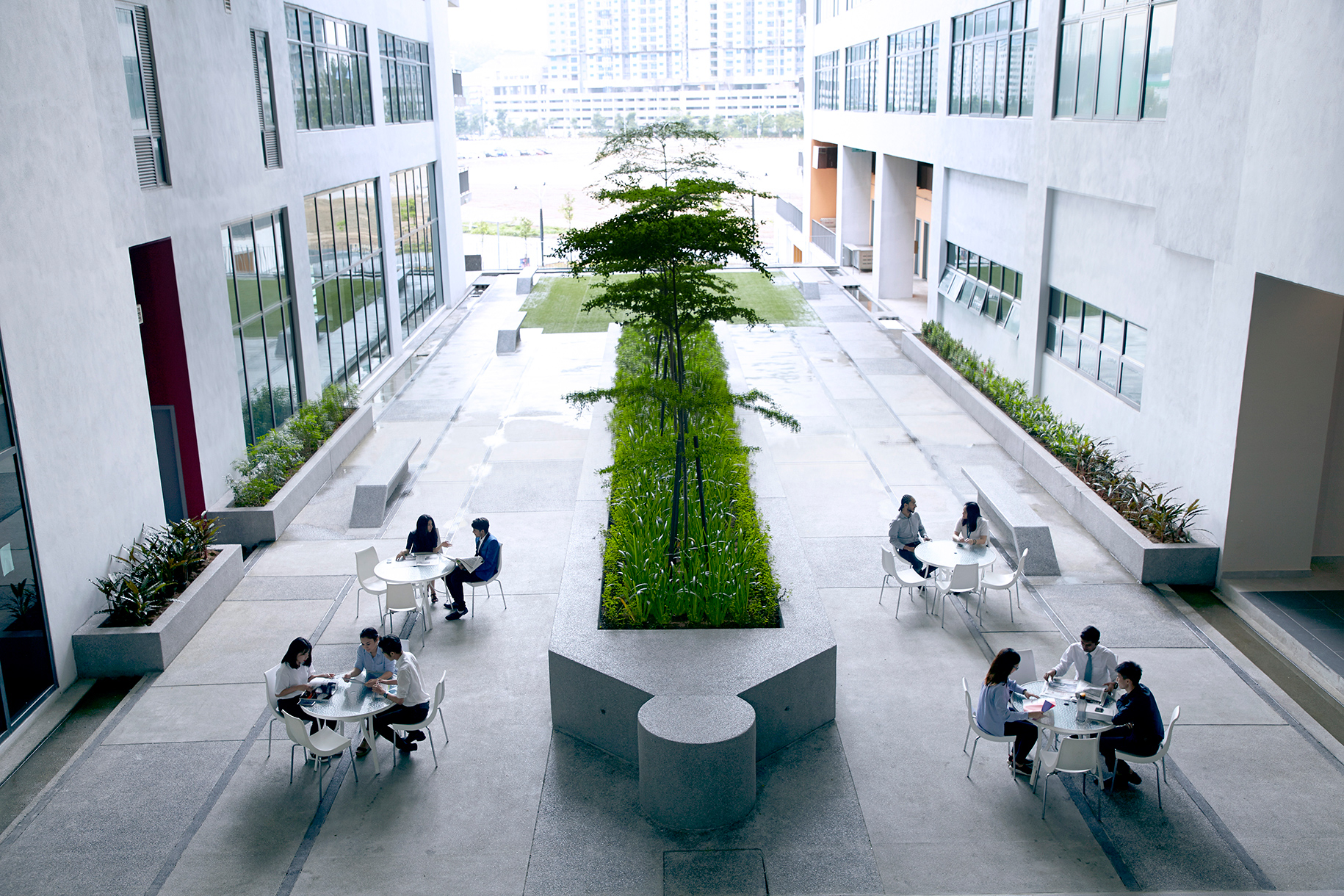
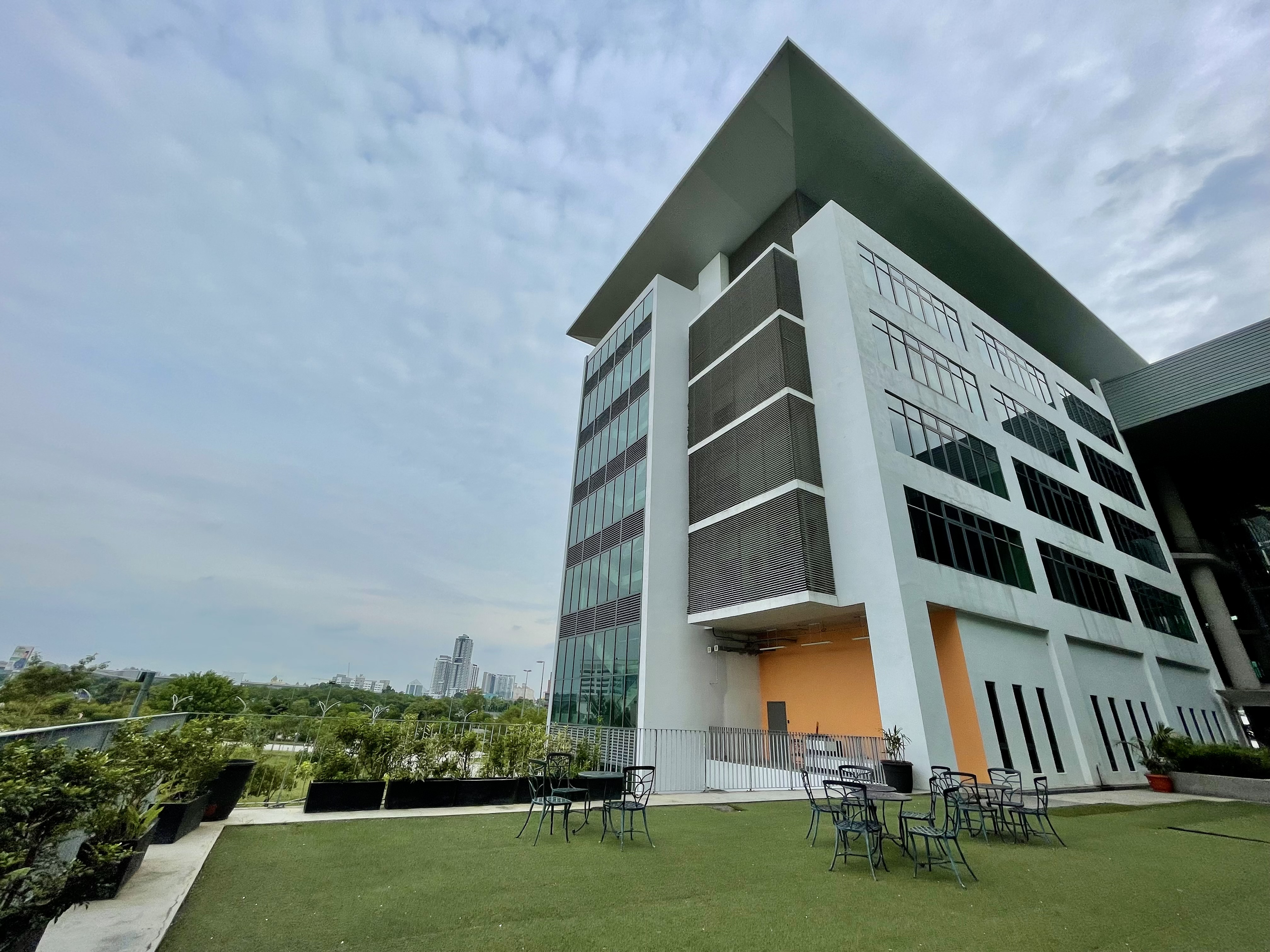
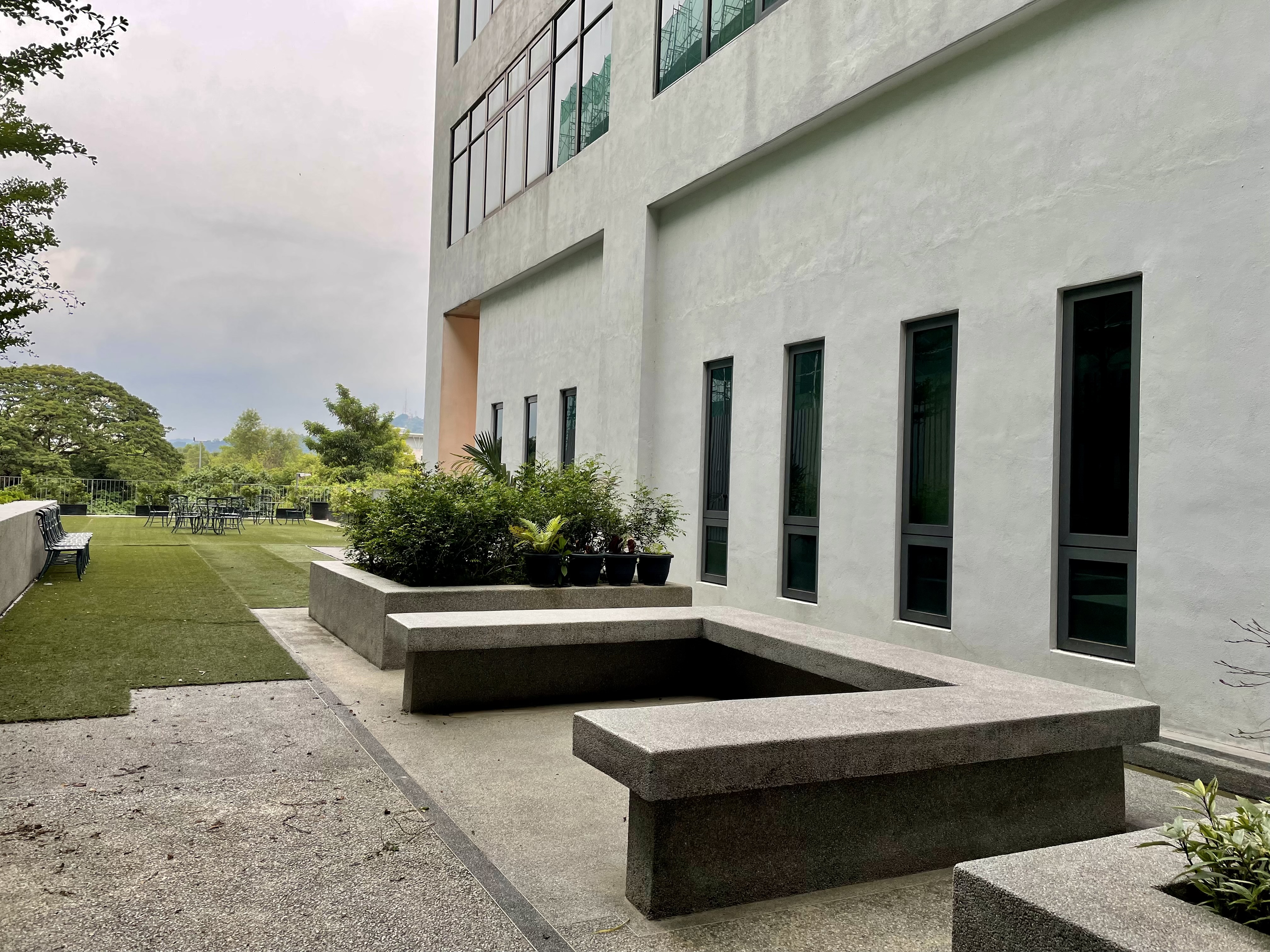
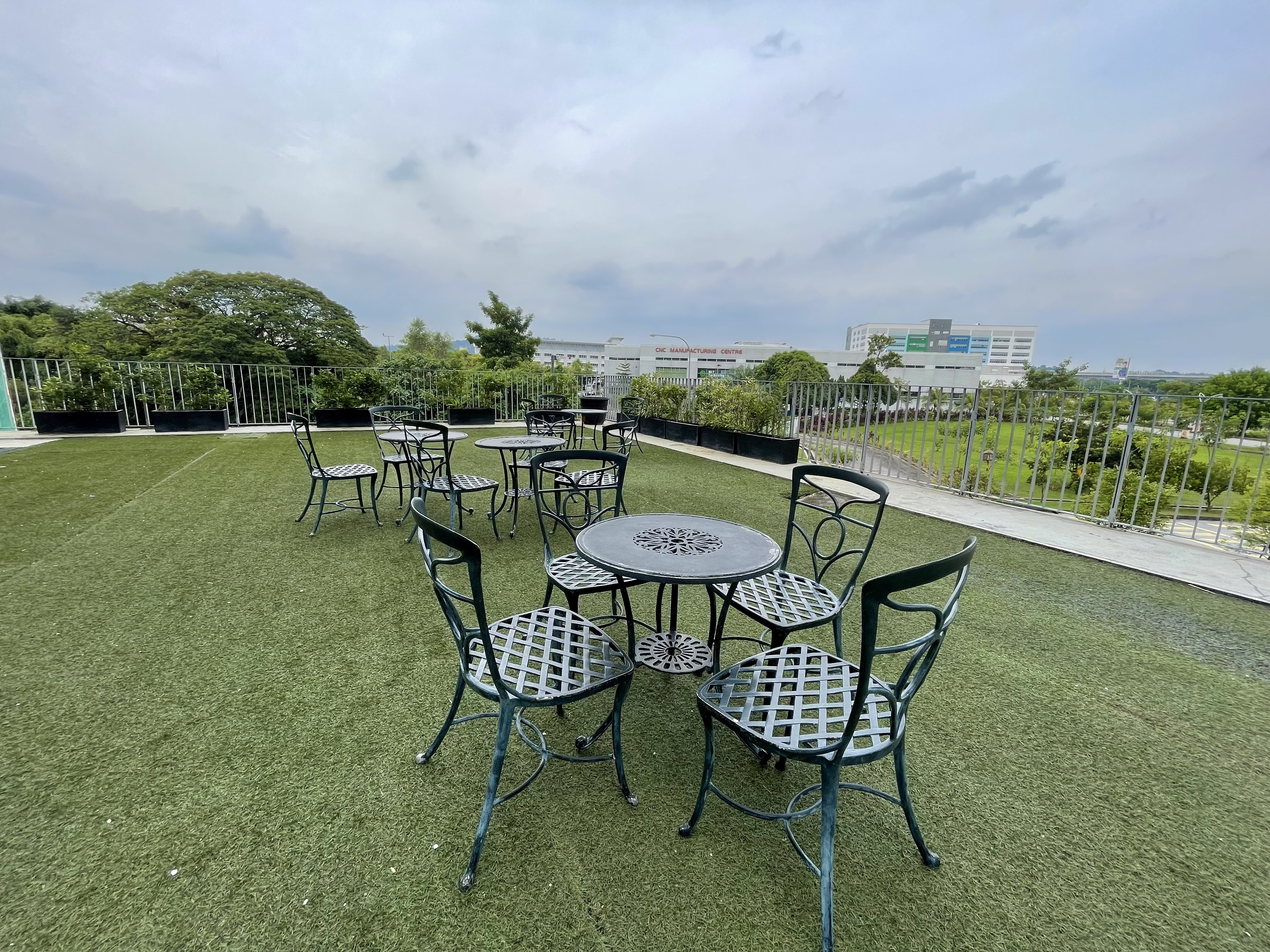
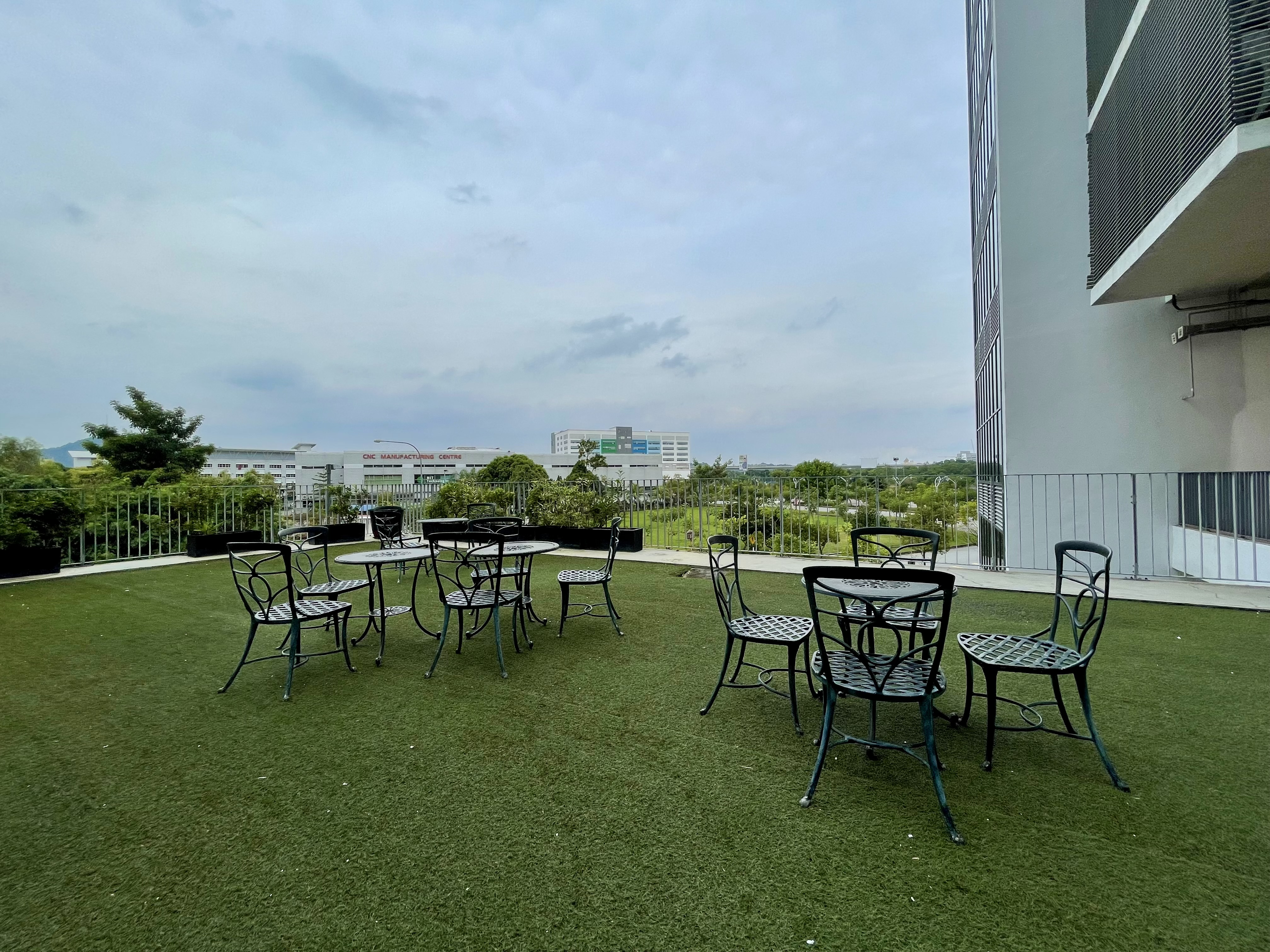
Other Initiatives & Campaigns Undertaken
- Fundraising event for Green Peace Malaysia, more than RM 1,000 have been raised.
- Students have created a team known as APU Nature’s Musketeers – they have an insta page where daily facts on environment problems are shared.
- Students have created insta reel challenges – APU student community are encouraged to recycle items instead of throwing them away.
-
6. Environment and Climate Change Policy

ENVIRONMENT & CLIMATE ACTION POLICY
Sustainable Development – "development that meets the needs of the present without compromising the ability of future generations to meet their own needs” (Brundtland Report, 1987). We at APU are committed to sustainable development and operating practices through the responsible management of building design, construction, and renovation, landscape practices, energy use, water and waste management, emissions, transportation, and procurement, within a framework of regulatory compliance and fiscal prudence. Through bold leadership and, in alignment with Government and industry, we will put environmental issues at the forefront of our operations. We recognize the role we can play in driving policy, changing behaviors and providing new ideas and solutions to difficult global problems.
CLIMATE ACTION GOALS:
To integrate environmental and carbon action into all University processes and to maximize the influence of the University in reducing its footprint through education research and its operations.
APU has committed to achieving net zero greenhouse gas emissions by 2050. This is not a simple journey but it is necessary and important. Reaching net zero emissions will require collective effort and support from all our staff, students, and external stakeholders. To achieve this, we must ensure that we integrate climate action into all that we do. Please read the commitent HERE.
RESPONSIBILITY:
The Environment and Climate Action Board (attendees from Research, University, Professional Services and Students) is accountable for ensuring the Policy is implemented. Implementation will be embedded in all new decisions/ operations and activities. All employees have a responsibility to ensure that the aims and objectives of the policy are met.
APU APPROACH:
- We will seek to create a culture on campus that supports and encourages staff and students to recognize that we all have an element of personal responsibility for the environment and to act on that.
- We will strive to integrate and balance economic, social, and environmental responsibilities within all its activities. We are committed to operate as a responsible University, addressing the challenges of sustainable development.
- We will continually improve, and to meet environmental legislative and regulatory requirements as they relate to all our activities.
- We will continuously review our performance against the sustainability strategy using a quantitative and qualitative performance measurement approach. A report will be circulated to all APU Board members for review.
POLICY AIMS:
The University requires its staff, students, partners and suppliers to:
Comply with all relevant environmental legislation and regulations as well as other requirements to which they subscribe,
- Set, communicate and implement clear objectives and targets to ensure continued improvement in environmental performance,
- Proactively act in ways to support environmental and climate action, raising awareness and recognizing positive action, whether it be teaching, researching or other University related activity,
- Demonstrate commitment to managing, minimizing, and mitigating the impacts from operations, activities, research, and education,
- To co-operate, where possible, with others to develop, utilize and share best practice in terms of environmental performance at a local, regional, and international level,
- Demonstrate commitment to improve continually and monitor environmental performance, report openly and transparently to support greater recognition of the benefits of environmental change and ensure that outcomes do not create a detriment to any group with protected characteristics within our community.
The University will embrace the Environment and Climate Action Agenda both strategically and globally through its development of footprint reduction initiatives, Climate Action plans and staff, student, and community engagement. We will strive to minimize negative impacts and optimize positive opportunities by delivering our Climate action targets and goals through our strategies, recognizing our global and local reach, through the divers operations, partnership and programs.
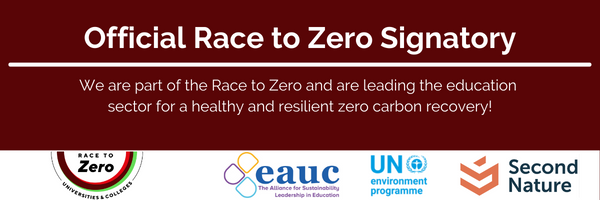

-
7. Sustainable Procurement Policy

PROCUREMENT POLICY:
Sustainable Procurement is a process that integrates environmental, governance and social factors of corporate responsibility in procurement processes and decision making, while ensuring they meet the stakeholder requirement. It is also referred to as environmentally preferred purchasing, green procurement, affirmative procurement, eco-procurement, and environmentally responsible purchasing. The purpose of this policy is to outline how the University will achieve its strategic sustainability aims through its procurement activities.
PROCUREMENT GOALS:
To improve the sustainability impact of our procurement by purchasing goods and services that advance the achievement of APU’s sustainability goals, purchasing from manufacturers and suppliers who share our commitment to sustainability and leveraging the buying power of APU to incentivize others to work towards our standards.
RESPONSIBILITY:
All University contracted and sub-contracted services shall adhere to this policy. This policy is applicable to all goods, services, works (including construction) and utilities purchased by the University and is the responsibility of all employees involved in the process.
APU APPROACH:- We will ensure there is sufficient knowledge and capacity in their respective Services to deliver the requirements of the standard and facilitate progress across all those included in the process.
- We will facilitate the delivery of sustainable procurement through the category management process, including tendering activity, contract management and value tracking, seeking continuous improvement where possible.
- We will encourage new and existing suppliers to consider and improve the social and environmental impacts of their services and activities by providing appropriate tools.
- We will consider how we can support the circular economy through our procurement and purchasing decisions.
- We will make appropriate training available to all staff including procurement specialists, buyers and others involved in purchasing decisions.
POLICY AIMS:
The University requires its staff, students, partners and suppliers to:- Eliminate the linear consumption of non-replaceable natural resources by reviewing current and proposed future usage and evaluating the pros and cons of alternatives from a life cycle lens,
- Identify sustainable procurement priorities and incorporate into the category management process, adapted to each category as appropriate,
- Eliminate waste, including: any packaging, waste produced by the product or service, and waste generated by the eventual disposal of the product,
- Optimize the use of natural resources and cease, or where this is not possible, minimize the use of plastic and disposable items,
- For materials that cannot be otherwise avoided or eliminated, maximize their re-circulation within APU in such a way that maximizes their value through reuse, repair, re-manufacturing, recycling and composting,
- Engage with suppliers to ensure they understand our sustainable procurement requirements, collaborate to find innovative solutions, and ensure they meet comparable appropriate standards within their own supply chain,
- Seek continuous improvement and innovation about sustainable procurement.
APU Staff & Students publish book on "Sustainable and Innovative Green Public Procurement in Malaysia"
https://www.amazon.com/dp/B0CCZXJF53?ref_=pe_3052080_397514860
Every successful organiation depends on having a well-developed purchasing process to source all necessary products and services at the best price.
The University will continuously monitor and report annually on the performance measures and seek to improve the way we measure the impact of our procurement activities including carbon emissions and social value and will focus these efforts on high value, high impact and/or high-risk commodities. -
8. Sustainable Investment Policy

SUSTAINABLE INVESTMENT POLICY
Sustainable investment is known as "investment in an economic activity that contributes to an environmental or social objective, provided that the investment does not significantly harm any environmental or social objective and that the investee companies follow good governance practices". APU recognizes the importance of sustainable investing as a powerful tool to address social and environmental challenges while generating long term financial returns. The purpose of this policy is to outline the University principles, strategies and guidelines that will govern university’s investment decisions and align them with its commitment to sustainability.
INVESTMENT GOALS:
To integrate environmental, social and governance factors into the investment decision making process to identify and manage risk, promote responsible practices while minimizing any negative impact on its investment returns.
RESPONSIBILITY:
The Investment Board (attendees from Research, University, Professional Services and Students) is accountable for ensuring the Policy is implemented. Implementation will be embedded in all new decisions/ operations and activities. All employees have a responsibility to ensure that the aims and objectives of the policy are met.
APU APPROACH:- We will actively engage with companies through our investment managers to encourage best practice in environmental, social, and ethical standards.
- We will utilize the specialist knowledge of the investment managers will provide the University with the opportunity to make a positive contribution towards sustainability including alternative technologies in its investment portfolio.
- We will consider environmental and social issues when making an investment in a company, in the belief that socially sustainable companies are more likely to be successful in the long run.
- We will seek collaborations with other institutions, organizations, and industry experts to enhance our knowledge, share best practices ad foster innovation in sustainable investing.
- We will be periodically reviewed, updated, and evaluated to ensure its continued alignment with the university's sustainability goals and evolving best practices.
POLICY AIMS:
The University requires its staff, students, partners and suppliers to:
- Achieve attractive financial returns while considering the long-term risks and opportunities associated with sustainability factors.
- Invest in funds, companies and projects that contribute to the transitions to a more sustainable and inclusive economy, addressing challenges such as climate change, social inequality, and resource depletion.
- Diversify across various asset classes, sectors, and region to manage risk effectively and capture sustainable opportunities across different markets.
- Avoid direct investment in companies that have activities inconsistent with the educational and/or research objectives of the University.
- Raise awareness about sustainable investing among students, faculty staff and other stakeholders through educational program, seminars, and workshops.
- Report, benchmark and improve. Consideration is being given to how best to progress this in an effective and proportionate manner utilizing the expertise of academics within the University.
By implementing this sustainable investment policy, APU commits to integrating sustainability principles into investment practices, generating financial returns while addressing global challenges and contributing to the creation of more sustainable future. -
9. Equality, Diversity and Inclusion (EDI) Policy

EQUALITY, DIVERSITY, AND INCLUSION (EDI) POLICY
APU is committed to creating and maintaining an inclusive and diverse community that fosters equality and promotes respect for all individuals regardless of their race, color, ethnicity, national origin sex, gender identity, sexual orientation, religion, age, disability, socioeconomic status, and any other characteristic protected by applicable laws. We value the unique perspective and experiences that diversity brings and believe that an inclusive environment enhances learning, research, and innovation. By embracing a diverse community of voices, we are better able to address sustainability challenges within vulnerable communities.
EDI GOALS:
To create an inclusive community that is based on dignity, respect, and accountability, where everyone finds space to be themselves and to realize their potential irrespective of differences in cultural background, race, and ethnicity, sexual orientation, gender, identity, beliefs, or skills and abilities.
RESPONSIBILITY:
The Management Board (attendees from Research, University, Professional Services and Students) is accountable for ensuring the Policy is implemented. All members of the university community share the responsibility to comply with this policy, treat others with dignity and respect and contribute to creating an inclusive and welcoming environment. The equality and diversity activity are managed through key committees and implemented via formal policies, guidance and plans. The responsibility of equality and diversity extends beyond the University to also include subsidiary companies and collaborative partnerships.
APU APPROACH:- We seek to develop trust and openness, to create safe spaces for dialogue that explores differences, to achieve mutual understanding and respect.
- We will strive to promote talent, regardless of background recognizing that everyone has equal access to the same opportunities.
- We will strive to ensure that no requirements or conditions are imposed that could disadvantage individuals on any of the above grounds unless justifiable by means of achieving a legitimate aim.
- We will ensure policies and procedures including but not limited to, those dealing with flexible working, disciplinary, absence and complaints will be applied in a non-discriminatory way and will be assessed to ensure equality needs are met.
POLICY AIMS:
The University requires its staff, students, partners and suppliers to:
- To be proactive in promoting equality by embracing, valuing, and recognizing difference, through the implementation of a wide-ranging equality action plan that tackles all facets of inequality and discrimination, creating genuine equality of opportunity and outcomes, and promoting good relations between people of different groups and a commitment to paying equal pay for work of equal value,
- To recognize the negative impact on mental health of colleagues who have been affected by discrimination, hear their lived experiences, and provide support,
- To educate our communities of staff, students, and researchers to be advocates of social justice (related to delivering a socially engaged curriculum in a general manner across the school),
- To work with our student community to decolonize our curriculum content, and grow other areas of inclusivity to address and welcome diversity,
- To ensure fair and inclusive access to resources, facilities, programs, and services, strengthened by inclusive policies and practices,
- To ensure recruitment and selection processes for faculty, staff and student positions will be conducted in a fair and unbiased manner, ensuring equal opportunity for all qualified applicants.
- To address intergroup disparities in representation, attainment, and continuation, with a focus on intersectionality,
- To ensure all learning and teaching, training, and personal development – assessment criteria, performance reviews, and development will be applied in a non-discriminatory manner and to actively promote equality; and outcomes and processes will be reviewed to ensure that indirect discrimination does not occur.
The University will take positive Action including seeking, allocating and delivering adequate resources. In addition, The University will review the equality implications of its policies and procedures monitoring their outcomes and ensure continuous improvements are made. Reasonable adjustment will be made where required to enable participation, to promote inclusion and diversity, and overcome barriers to inclusions. -
10. Corporate Social Responsibility@APU
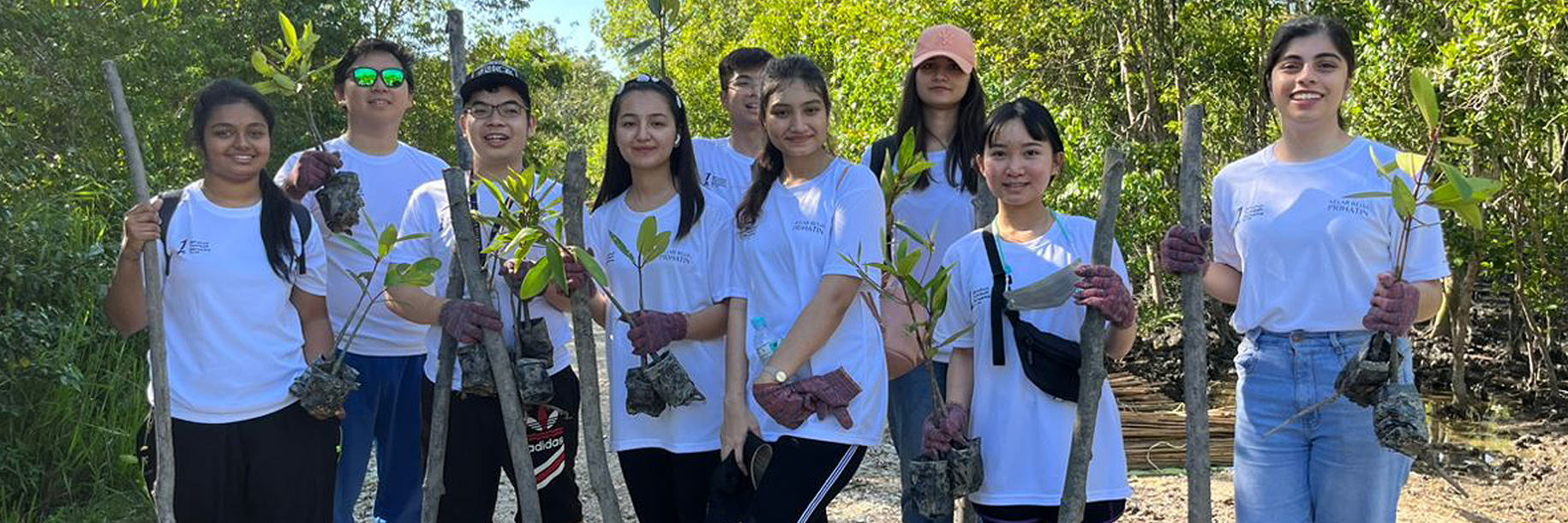
Asia Pacific University (APU) has been actively engaging in multiple corporate social responsibility (CSR) projects over recent years. These projects have focused on a variety of areas, including education, environmental sustainability, and community development.
Some notable projects recently undertaken by APU are:
- Providing flood relief to victims of natural disasters
- Organising fundraising events for charitable organisations
- Volunteering at local schools and community centers
- Promoting environmental sustainability through recycling and energy conservation initiatives
APU's CSR projects are a testament to the university's commitment to social responsibility. The university is committed to using its resources to make a positive impact on the world around it.
2024
- APU’s School of Foundation and Elshaddai Refugee School Collaborate for 5th CSR Project
- APU Accounting & Finance Students Excel at MICPA X Ca ANZ Accountancy Week 2024
- Noodle Production Process Excites SoMM Students during Industrial Visit to Top Snack Factory
- Proton City Industrial Visit: Unveiling the Heart of Malaysian Automotive Excellence
- Future Environmental Advocates Embrace Nature in 'Go Green FRIM Explore Race 2024'
- Industrial Visit at Menara Maybank Empowers APU Students With Insight Into Banking Technology
- Beyond Classroom Experience: APU Students Explore the World of Hospitality and Tourism at MATTA Fair 2024
- BDO Malaysia Visit Sparks Career Inspiration for APU Accounting & Finance Students
- Day of Discovery: APU Unveils the World of Cyber Security to SMK St. Dominic Students
- A Transformative Journey Empowering Refugee Students Through Digital Literacy
- Sun, Sand, and Social Impact: Promoting Sustainability Principles and Environmental Awareness Amongst Rumah Shalom Youths
- Celebrating APU's CSR Endeavors by Empowering Refugee Students Through Public Speaking
- Transformative Workshops in Psychology at APU for Nurturing Innovation
- APU Students Take a Deep Dive into the Future of PROTON
- A Slice of Innovation: APU Students Witness the Magic Behind Gardenia’s Bread
- APU SoF Successfully Completes Second Monthly Routine of Year-long CSR Project for Refugee Children
- APU School of Foundation's Transformative ESG Initiative at Elshaddai Refugee School
- Building a Brighter Tomorrow by Empowering Youth to Lead
- An Actuary’s Journey to a Meaningful SDGs Future
- 2024 QS World University Rankings- Sustainability
2023- Nurturing Emotional Intelligence
- APU Chapter of AMAR Club Launch: Making Waves in Professional and Ethical Conduct
- Girl Power Meets Tech Savvy: APU Empowers Selangor’s Girl Guides with Thrilling Workshops!
- APU Cultivating Sustainability in Tackling Food Waste and Nurturing Responsible Consumption
- APU Wayang Kulit La Coloration Challenge 2023: A Cultural Voyage for French Students
- Spine & Mind Harmony
- APU students’ triumph at ACI YLS Sustainability Startathon, head to Singapore for Youth Leadership Summit
- Fostering Sustainable Living and Social Responsibility through Community Engagement
- Real-World Business Exposure and Fun Learning at Yakult Malaysia for APU Students
- Exploring the Extraordinary at the Postnormal Times Exhibition
- Empowering Communities Through Mathematical Excellence
- APU-UNESCO Chair 'Digital Initiative' @ Refugee Festival 2023 Empowers Deprived Communities
- ISUC Hosts Transformative Powerpoint Presentation Skill Workshop for Pusat Kreatif Kanak-Kanak Tuanku Bainunn (PKKTB)
- APU's ESG Initiative Fosters Patriotism and Develops Digital Skills Among Orphanage Children
- APU Eco-Tourism CSR Project Empowers Indigenous Community
- Fostering Global Academic Enrichment: A Spotlight on the SIMATS Student Mobility Programme at APU
- APU’s ESG Initiative Builds Coding Skills Among SMK USJ 23 Students
- APU student book donation project brings joy to community
- APU’s IMechE Student Chapter Spread Awareness on Plastic Waste Disposal at Port Dickson
- Volunteerism and Animal Care @ Zoo Negara develops Socially Responsible APU Scholars
- [APU] Set to collaborate with MoE to integrate UN SDGs into the curricula - StudyMalaysia.com
- Saving Lives With Flood-assist Drone: A Brainchild of Multidiscipline Engineering Students at APU - StudyMalaysia.com
- [APU] Set to collaborate with MoE to integrate UN SDGs into the curricula - StudyMalaysia.com
- Innovative Ultrasonic Scarecrow by Primary School Students Won PIID Award – a Scientific Project Mentored by APU SoT and SoC staff - StudyMalaysia.com
- APU team won 1st place in the Water Vanguards Challenge 2023 - StudyMalaysia.com
- Varsity team imparts life skills with dose of fun to orphanage children | The Star
- Boost for financial literacy | The Star
- APU INVENTS STABILISING SPOON FOR PEOPLE WITH PARKINSON’S | The Star
- Tawaran Tajaan Pelajar Cemerlang FELDA 2023 (studentportal.my)
- APU工程系學生合力設計水災救難無人機 - 副刊 - 新教育 - 教育導航 (sinchew.com.my)
- Asia Pacific University (APU) team won 1st place in the Water Vanguards Challenge 2023 (easyuni.my)
- TalentCorp Launches Women Empowerment Month (WEM) 2023, Celebrates Talents Who Are Creating Positive Impact - Press Releases | TalentCorp Malaysia
- 4 Tamil school pupils win tech competition with Smart Scarecrow (thesundaily.my)
- SJK (T) Ladang Bukit Jalil students create smart scarecrow - Citizens Journal (cj.my)
- School Of Psychology CSR Initiative: Special Educational Needs Children And Teenagers Camp
- Mindfulness And Well-Being For Yemeni Refugee Children Through ‘Yoga Gives Back’ Programme
- Planet-friendly: Sustainability Heroes Of APU ISUC Student Chapter
- Loving And Giving: APU Community Celebrate Ihya’ Ramadan By Sharing ‘rizki’
- APU Handover RM14,038.90, Türkiye-Syria Fund to Mercy Malaysia
- Financial Literacy For Kids: How To Raise Them Well?
- Syawal Fest 2023: A Festival of Unity, Diversity & Culture
- Innovative Ultrasonic Scarecrow by Primary School Students Won PIID Award – a Scientific Project Mentored by APU SoT and SoC staff
- Varsity Team Imparts Life Skills with Dose of Fun to Orphanage Children
- Reaching Out to Indigenous & Underprivileged Communities
2022Innovative Ecotourism & Green Ocean Invention gains James Dyson Award - StudyMalaysia.com
APU’s CSR Efforts of Creating a Mural for the FurryKids Safehaven - StudyMalaysia.com
Rapid Disaster Relief and Response by APU Community - StudyMalaysia.com
APU Students Joining Forces with Kechara Soup Kitchen - StudyMalaysia.com
‘Pandemic Leadership Award 2021’ for APU Volunteer Leader - StudyMalaysia.com
Presidential Award for SPE Outstanding Student Chapter at APU - StudyMalaysia.com
Paving the Way for Felda's New Generation Digital Education Programme - StudyMalaysia.com
APU: Creating A Safer & Better Environment For Our Furry Friends! • MYC! Malaysian Youth Community
APU Students Join Hands to Create a Mural for the FurryKids Safehaven (eduadvisor.my)
APU Celebrates International Earth Day in a Series of Fun-Filled Events (eduadvisor.my)
Academia-Industry Partnership Driving SDG And ESG Goals In Supply Chain & Logistics (afterschool.my)
APU Students Joining Forces with Kechara Soup Kitchen (afterschool.my)
APU’s CSR Efforts of Creating a Mural for the FurryKids Safehaven (afterschool.my)
Pandemic Leadership Award 2021 for APU Volunteer Leader (afterschool.my)
Paving The Way For FELDA’s New Generation Digital Education Programme (afterschool.my)
Innovative Ecotourism & Green Ocean Invention gains James Dyson Award (afterschool.my)
行管令期间致力关怀志愿工作 陈玮祥获颁疫情领导奖光华日报 | 1910年创刊 创新每一天生活 (kwongwah.com.my)
亚太科技大学志工领袖陈玮祥 赢得槟州2021年疫情领导奖 | 北马 | 地方 | 東方網 馬來西亞東方日報 (orientaldaily.com.my)
13 pelajar cemerlang FELDA dapat biasiswa RM1.5 juta (bharian.com.my)
Felda taja 13 pelajar lanjutkan pelajaran dalam bidang digital (utusan.com.my)
APU’s ISUC Student Chapter Initiated A Quick Relief Move During The Recent Floods Disaster
APU’s CSR Efforts Of Creating A Mural For The FurryKids Safehaven
APU Student Community Humbled By ‘bubur lambuk’ Preparation For The Underprivileged Community
Raudhathul Al-Faeez Orphans Get Aidilfitri Aid From APU Clubs & Societies
Beach Cleaning Initiative: 40 APU Students Join Hands At Beach Clean-Up
SJK(T) Kinrara Students Excited To Learn Computer Science With ViRa Robot
CSR Programme To Help Underprivileged Children Acquire Digital Skills
APU Students Raising Funds For Charity While Sharpening Their Entrepreneurial Skills On Campus
Saving Wildlife By Roar & Run – Knowing The Plight Of The Tiger
2021MoU Between APU And FurryKids Safehaven Instils Social Responsibility Values
APU Students Exhibit Social & Community Responsibility Through Restoring Animal Shelter
2020
2019 -
11. ESG & Sustainability Events – Activities@APU

We take pride in our commitment to Environmental, Social, and Governance (ESG) practices and sustainability. From engaging workshops and awareness campaigns to hands-on initiatives, our ESG-focused events are thoughtfully curated to address global challenges, empowering our students and staff with practical knowledge and skills to effect meaningful change.
Prof. Dr. Abtar Darshan Singh, our Professor of Innovative Digital Learning at APU, is the first academic from a private university in Malaysia to be appointed as the UNESCO Chair on Harnessing Innovations in Technology to Support Teachers and Quality Learning.
Under her direction, the video below features a series of projects that showcase the potential of technology to transform teaching and learning.By coming together in these purpose-driven endeavors, we believe in creating a ripple effect that extends far beyond our campus, positively impacting communities and inspiring a sustainable mindset worldwide.
Some other notable projects undertaken by APU are listed as follows:
APU’s School of Foundation and Elshaddai Refugee School Collaborate for 5th CSR Project
From Blackboard to Firewall: Protecting Malaysia’s Schools in the Digital Age
APU Aligning with Malaysia’s Ambitious Vision for the Semiconductor Industry
APU & KL SPE Chapters Bring Joy to Raudhatul Al-faeez Orphanage
Future Environmental Advocates Embrace Nature in 'Go Green FRIM Explore Race 2024'
NDO & APU Empowering the Underprivileged With Digital Skills
A Transformative Journey Empowering Refugee Students Through Digital Literacy
APU & 9 Universities Embracing Immersive Learning by Joining CelcomDigi Metaversity Initiative
[StarTech] Progress and preservation: Tech industry needs eco equation
APU UNESCO Chair Academics Empowering Education through Gen-AI Workshops in Sri Lanka
Celebrating APU's CSR Endeavors by Empowering Refugee Students Through Public Speaking
APU SoF Successfully Completes Second Monthly Routine of Year-long CSR Project for Refugee Children
APU Merdeka Fiesta 2023: An Extravaganza Celebration of Unity and Diversity
APU’s IMechE Student Chapter Spread Awareness on Plastic Waste Disposal at Port Dickson
Varsity Team Imparts Life Skills with Dose of Fun to Orphanage Children
Planet-friendly: Sustainability Heroes Of APU ISUC Student Chapter
Set To Collaborate With MoE To Integrate UN SDGs Into The Curricula
School Of Psychology CSR Initiative: Special Educational Needs Children And Teenagers Camp
Volunteerism and Animal Care @ Zoo Negara develops Socially Responsible APU Scholars
APU Mental Health Week Campaign Paves the Way for Organising Special Needs Children Camp
Bin-Novate Sustainable Solutions Takes Second Place at ACIYLS 2023
[The Star] Sustainable Innovation Ensures Dignity for Deceased
[Study Malaysia] Fostering Sustainable Living and Social Responsibility Through Community Engagement
[Easy Uni] APU Mental Health Week Campaign Paves the Way for Organising Special Needs Children Camp
[The Sun] Students raise awareness on importance of mental health
[Citizens Journal] Students create AI platform for elderly care
[The Sun] 4 Tamil school pupils win tech competition with Smart Scarecrow
[Citizens Journal] Eco-tourism project to empower indigenous community launched
[Medium] Women in Tech series: Bridging the gap with Digital Innovator Daisy Gladys Iteriteka
[The Star] APU Invents Stabilising Spoon for People With Parkinson’s
[Study Malaysia] Set to collaborate with MoE to integrate UN SDGs into the curricula
[Study Malaysia] APU team won 1st place in the Water Vanguards Challenge 2023
APU School of Foundation's Transformative ESG Initiative at Elshaddai Refugee School
APU AKPK Club Hosts Dual Financial Empowerment Affairs at Sasana Kijang, Bank Negara Malaysia
APU and Experian Malaysia Forge Dynamic Partnership to Empower Future IT Leaders
Jurutera featured Prof. Ho’s AI Revolution in Engineering Education
Partnership with Advance Pact to Focus on Healthcare Device Optimisation and Management
APU Chapter of AMAR Club Launch: Making Waves in Professional and Ethical Conduct
APU’s International Partnerships Drive Comprehensive Product Development for Digital Transformation
Girl Power Meets Tech Savvy: APU Empowers Selangor’s Girl Guides with Thrilling Workshops!
SERENIX - A Compassionate and Sustainable Innovation in Handling the Deceased During Emergencies
APU Cultivating Sustainability in Tackling Food Waste and Nurturing Responsible Consumption
APU Wayang Kulit La Coloration Challenge 2023: A Cultural Voyage for French Students
VFX, Animation & Gaming Industry Professionals Inspire APU Community @ MYDCF 2023
Fostering Sustainable Living and Social Responsibility through Community Engagement
Real-World Business Exposure and Fun Learning at Yakult Malaysia for APU Students
Exploring the Extraordinary at the Postnormal Times Exhibition
APU-UNESCO Chair 'Digital Initiative' @ Refugee Festival 2023 Empowers Deprived Communities
Muzium Negara’s 60th Anniversary features Digital Launch Gimmick by APU students
Disaster Management AI-powered Drone Wins Gold Medal at WICO 2023
The Lost Food Project & APU - Tackling Food Waste, Feeding the Underprivileged
APU's ESG Initiative Fosters Patriotism and Develops Digital Skills Among Orphanage Children
Fostering Global Academic Enrichment: A Spotlight on the SIMATS Student Mobility Programme at APU
APU’s ESG Initiative Builds Coding Skills Among SMK USJ 23 Students
“Kingdoms of Diversity” Showcases a Harmonious Flourishing Multicultural Community at APU
Saving Wildlife By Roar & Run – Knowing The Plight Of The Tiger
Saving Lives With Flood-Assist Drone: A Brainchild Of Multidiscipline Engineering Students At APU
Education Tool On Online Abuse And Exploitation Bags Award At ASEAN MakeITSafe Hackathon 2022
Embed Entrepreneurial DNA Into Graduates Says APU Director Of Research
APU Students Raising Funds For Charity While Sharpening Their Entrepreneurial Skills On Campus
CSR Programme To Help Underprivileged Children Acquire Digital Skills
Autonomous Wheelchair Prototype Won First Place In IEM Competition
Innovative Ecotourism & Green Ocean Invention gains James Dyson Award
Paving The Way For Felda's New Generation Digital Education Programme
ERASMUS+ FRIENDS Project Malaysia National Conference On Internationalisation At Home (IaH)
Malaysia’s ‘Little England’ Thrills APU International Students
Beach Cleaning Initiative: 40 APU Students Join Hands At Beach Clean-Up
Raudhathul Al-Faeez Orphans Get Aidilfitri Aid From APU Clubs & Societies
International Mother Earth Day Was Commemorated By APU Students In A Fun And Creative Way
APU Student Community Humbled By ‘bubur lambuk’ Preparation For The Underprivileged Community
APU Computer Wizards Emerged Top 15 In Varsity Hackathon 2022
Academia-Industry Partnership Driving SDG And ESG Goals In Supply Chain & Logistics
Cross-Border University Collaborations Enhance Entrepreneurship Skills
Embed Social Consciousness And The Values Of Volunteerism Among APU Students
SAF Senior Lecturer Dr Leow Hon Wei’s Research Paper Published In An Esteemed Journal
APU’s CSR Efforts Of Creating A Mural For The FurryKids Safehaven
APU’s Student Won 2 Gold Awards + 2 Special Awards At AIINEX 2021
APU’s ISUC Student Chapter Initiated A Quick Relief Move During The Recent Floods Disaster
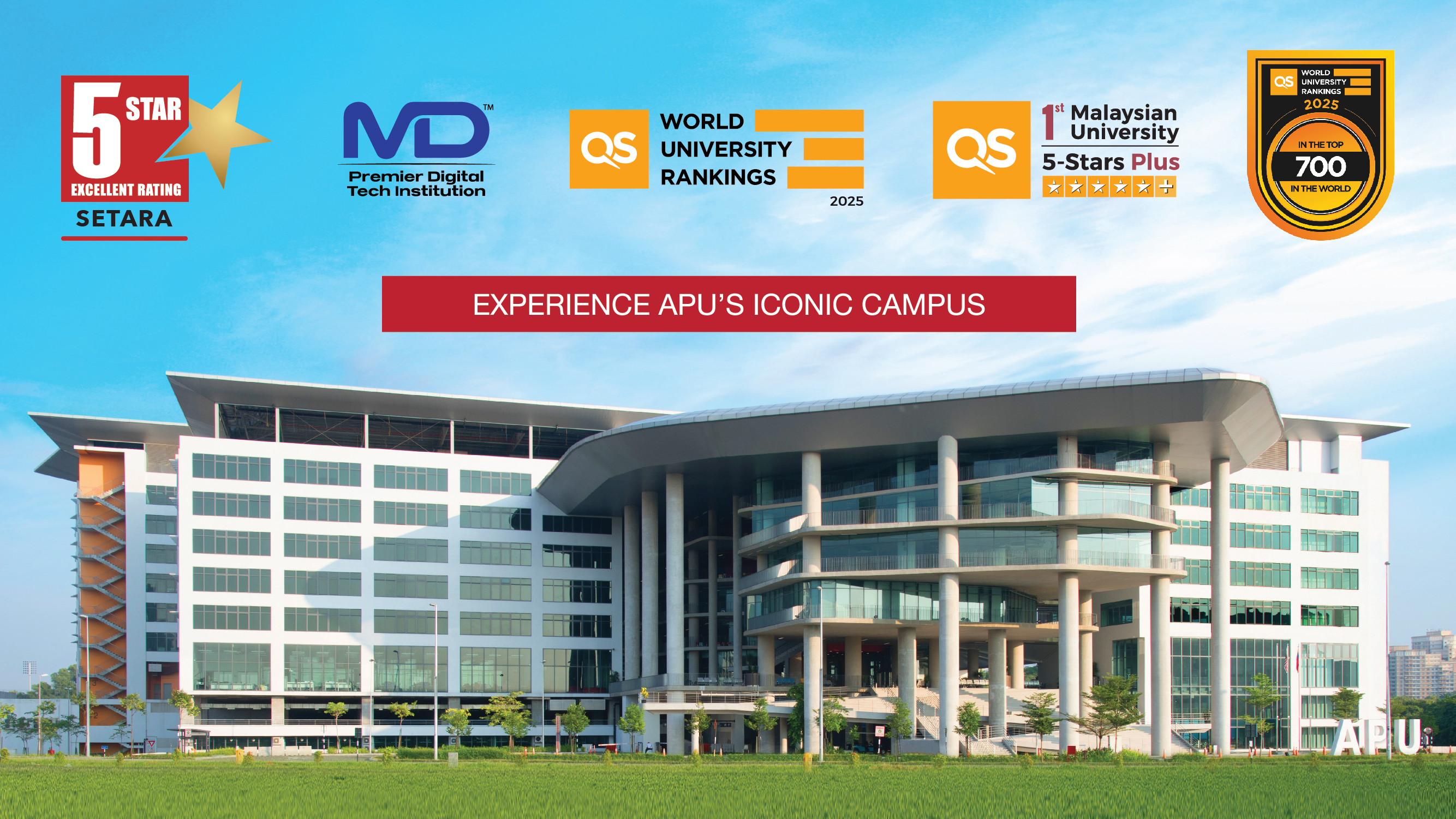
Pathways@APU
Intake Calendar
Facilities
Want to know more ?
Let’s Connect